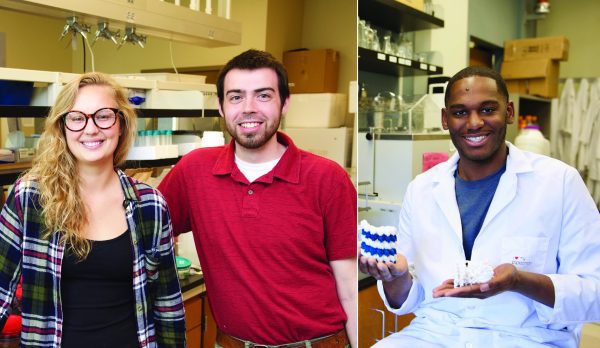NSF Graduate Research Fellows Enhance Reitzel Lab

Adam Reitzel’s marine sciences lab includes three National Science Foundation Graduate Research Fellows (and other NSF grantees). Recipients of these fellowships are high-potential, early-career scientists and engineers, who receive funding to support graduate research training in science, technology, engineering and mathematics (STEM) fields. In addition to covering students’ research and educational expenses, the NSF Graduate Fellows program provides access to diverse research experiences and research settings around the world.
Here doctoral students Remi Ketchum and Tyler Carrier and master’s student Devin Clegg talk about their NSF Graduate Research Fellowship opportunities.
What is unique about the research you are conducting with NSF Graduate Research Fellowship support?
Ketchum
: My research focuses mostly on how marine organisms adapt to climate change and the associated thermal stress and salinity stress. Climate change has resulted in the warming of coastal aquatic habitats around the world at almost every latitude, threatening estuarine and marine ecosystems with a massive loss in biodiversity and potential collapse.
Carrier: The questions I’m exploring are rooted in fundamental evolutionary and ecological processes. They are unexplored, which leaves room to expand our understanding of how and why microbes are essential for life. Within the fields of larval biology and animal-microbial symbiosis, there is excitement as to what we can find out. This is one of the first times we’re looking at the microbiome–or microbial communities–of marine invertebrate larvae, especially in their natural environment.
Clegg: I’m looking into an organism that is not a conventional model organism –the sea anemone, a cnidarian. I’m researching a transcription factor, a protein that aids in the regulation of other specific proteins that help with things ranging from normal development to antioxidant properties and more.
Why are outreach and collaboration important to your development as a scientist?
Ketchum
: Key components of becoming an academic are mentoring students and education outreach. Dr. Reitzel’s laboratory is ideal for my pursuit of graduate training; not only is he at the forefront of evolutionary ecology but he is also actively involved in educational outreach. My goals are to become an independent evolutionary ecologist who studies important questions in marine life research and conservation, a professor who trains future scholars and a mentor involved in public outreach.
Carrier: Being awarded this fellowship means that the NSF and leaders in the scientific community are investing special resources in me to fuel my training as a scientist, educator, and citizen of the world. This allows me to join an “elite club” of academics worldwide who are making significant pushes to answer some of the biggest and most important questions.
Clegg: One of my goals as an NSF Graduate Research Fellow is to be an influential mentor to younger individuals. Dr. Reitzel and his current graduate students present their research and create curriculum exercises to bring together new results with general concepts in biology. I will participate and lead outreach activities to provide a strong influence in biology and inspire scholars to perform research.